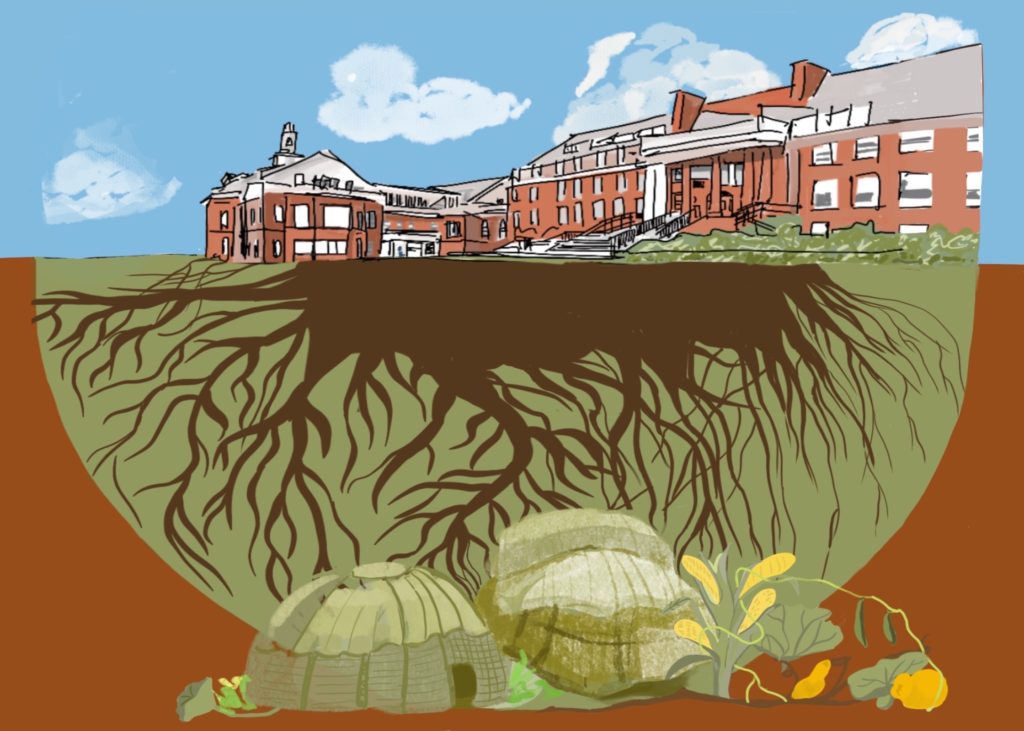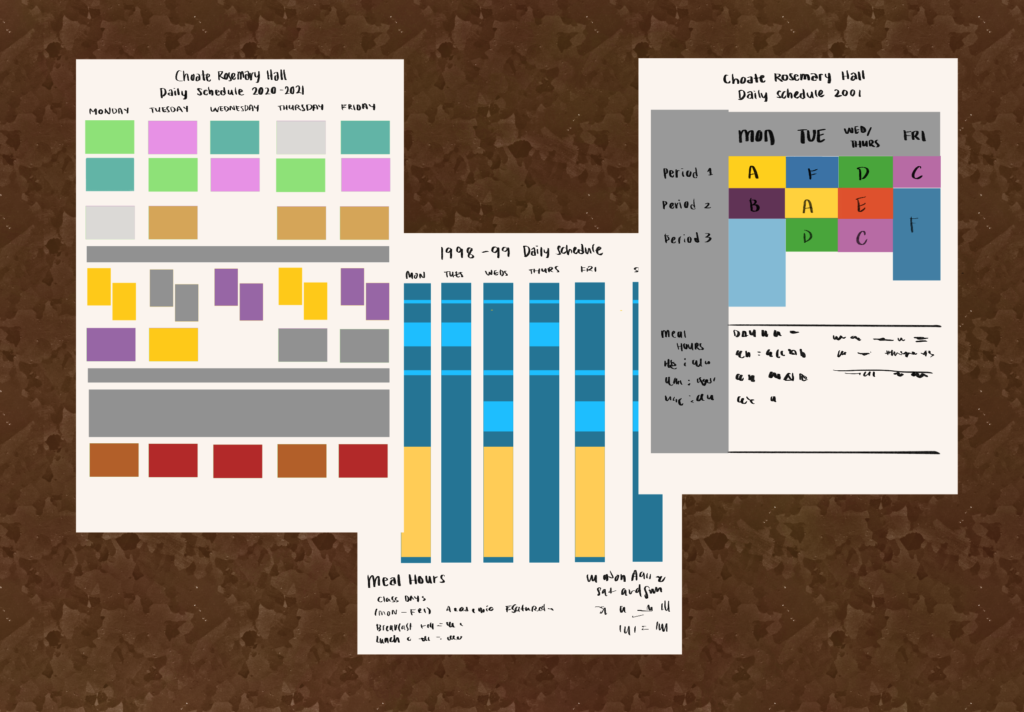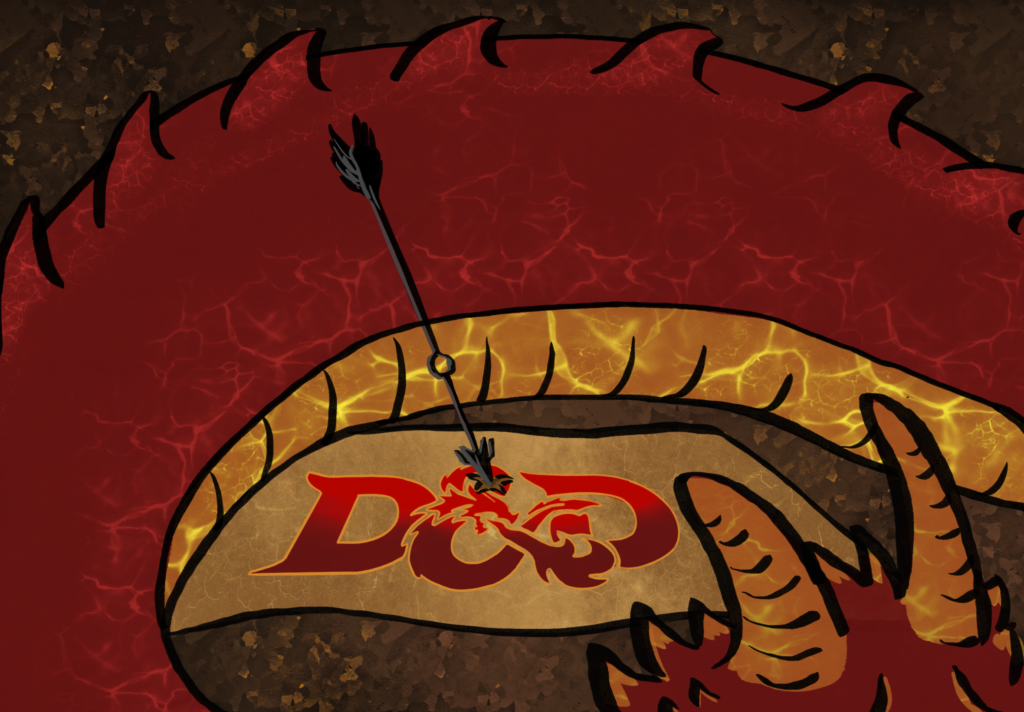On Indigenous People’s Day on October 12, Choate’s official social media accounts recognized the Quinnipiac tribe, on whose land Wallingford was established, with a quiet video of campus above a caption acknowledging the land that Choate is built on. According to HPRSS Department Head Ms. Kyra Jenney, the post was the first land acknowledgment statement from Choate’s social media pages.
Ms. Jenney, along with Spanish teacher Mr. Charlie Fuentes, Director of Equity and Inclusion Dr. Rachel Myers, Director of Faculty Development Mr. Tom White, and many other faculty members, are dedicating themselves to an initiative that would commit Choate to Indigenous acknowledgment, representation, and awareness.
Chaperoning a student at the 2019 World Individual Debate and Public Speaking Championships in Toronto last summer, Ms. Jenney noticed that the school hosting the competition, Branksome Hall, included a formal land acknowledgment statement on its website, as well as multiple presentations on the different tribes native to the Toronto area. Additionally, on campus, the descriptions and names of each building are written in not only English but also the regional Native language. Explaining the purpose behind their land acknowledgment, the school wrote on its website: “An acknowledgment is a call to action to take both individual and collective responsibility for the past and future of the communities of this land,” indicating their respect and gratitude to the Indigenous communities in the area. Inspired by Branksome Hall’s land acknowledgment efforts, Ms. Jenney and other faculty members are now drafting a proposal in hopes that Choate will do the same.
According to a guide entitled “Honor Native Land,” written by the United States Department of Arts and Culture, acknowledgment is a powerful way of showing respect and a first step toward correcting stories that erase Indigenous people’s history and culture.
“Choate doesn’t have a good infrastructure in acknowledging indigeneity,” said HPRSS teacher Ms. Rachel Kesler, one of Choate’s two Indigenous faculty members. “Part of the benefit of doing land acknowledgment is to recognize the Native people [who] continue to live here and also acknowledge that we as an institution continue to participate in settler colonialism. With the amount of privilege that we do have, we have to be understanding and recognize the people whose land we are living on right now.”
Currently, the School’s efforts of land acknowledgment are accomplished informally through social media posts and individual acknowledgments. However, as Ms. Jenney said, “Sometimes, these statements are performative. They are a way of acknowledging the Indigenous presence without making any systemic changes to make these institutions more inclusive, welcoming, and open.”
Director of Equity and Inclusion Dr. Rachel Myers agreed, saying that, as a community, we should “engage with Indigenous peoples and organizations that can give us guidance towards the best way to do so without it being performative in nature.”

Graphic by Rose Shen/The Choate News
Noting similarities with last June’s #BlackOutTuesday trend, where people around the world posted black squares on social media to recognize racism, Ms. Jenney explained how that event and informal land acknowledgment are both “one-time things where you are trying to be inclusive but not proceeding through with real, substantive change. That black square is self-serving and doesn’t do anything to be part of a broader restorative justice framework.”
She added, “The conversations that Mr. Fuentes and I have begun to have with others at Choate have centered around land acknowledgment plus educational programming for the community, professional development for faculty and staff, planning for the recruitment and retention of Native students, faculty, staff, etc …”
These types of land acknowledgments come in the form of referencing treaty rights, partnering and collaborating with Native Americans, and recognizing Native tribes and colonizers that were involved in the history of the territory. There is a traumatic history of Native American assimilation and genocide. Indigenous children, for instance, were forcefully taken from reservations and forced to assimilate into American society through harsh and deadly boarding schools. Many people feel that a formal acknowledgment of the Indigenous land that Choate resides on would indicate the School’s recognition of settler colonialism and commitments to restore justice.
However, land acknowledgment is just the first step of the School’s plans. “If a school is going to adopt land acknowledgment, it must be a part of broader institutional commitments that involve professional development of faculty and staff, education of students and other community members, and recruitment of Indigenous students and staff,” said Ms. Jenney. Ms. Kesler agreed with the sentiment that more needs to be done to acknowledge Choate’s Indigenous past. “There are a lot of small things the School can be doing that they haven’t taken the leap yet. There is a lot of conversation about race and equity and inclusion, but there aren’t talks about what it means to be Indigenous and acknowledging [that] these people had and still live here,” Ms. Kesler said.
Even though many faculty members are working toward these commitments, the Covid-19 pandemic has forced the School to turn its focus to issues of health and safety on campus. As a result, during the past several months, the need to ensure community safety has taken priority over the ongoing task of creating the formal land acknowledgment statement and also other efforts to promote Native American awareness and inclusion. For instance, an event that was canceled due to Covid-19 concerns would have invited Native American history experts to campus to teach Southern New England Indigenous history to the Choate faculty.
Nonetheless, Ms. Jenney, Mr. Fuentes, and other faculty members are continuing to hold meetings via Zoom. Dr. Myers said, “Right now, we are looking to partner with an organization and are looking into their availability to engage with us for some professional development for our community.” The idea of holding virtual Indigenous history lectures has also been discussed as part of the proposal.
Ms. Jenney added, “There are plans for additional workshops during the winter term that [Dr. Meyers] and Mr. White are coordinating and that Mr. Fuentes and I are hoping to help with.”
Even though many Connecticut universities, including the University of Connecticut and Quinnipiac University, have formal land acknowledgment statements and have collaborated with land-acknowledgement organizations, New England boarding schools rarely have these commitments. “It’s not something that a lot of our peer schools are doing, and hopefully that will change moving forward,” Ms. Jenney said.
With Choate’s upcoming formal land acknowledgment and other institutional commitments to inclusion and awareness of Indigenous communities in boarding schools, Ms. Jenney and her team hope to prompt other schools to “challenge myths of Indigenous erasure and harms of settler colonialism, and make our community more inclusive and intentionally anti-racist and anti-colonial.”
“When I think about a space like Choate, there isn’t that infrastructure of support and a ton of Native faculty members who students are able to look up to and a strong Native community necessarily,” said Ms. Kesler. “When I think about Natives in any academic setting, I think that scaffolding and institutional support is so important.”




